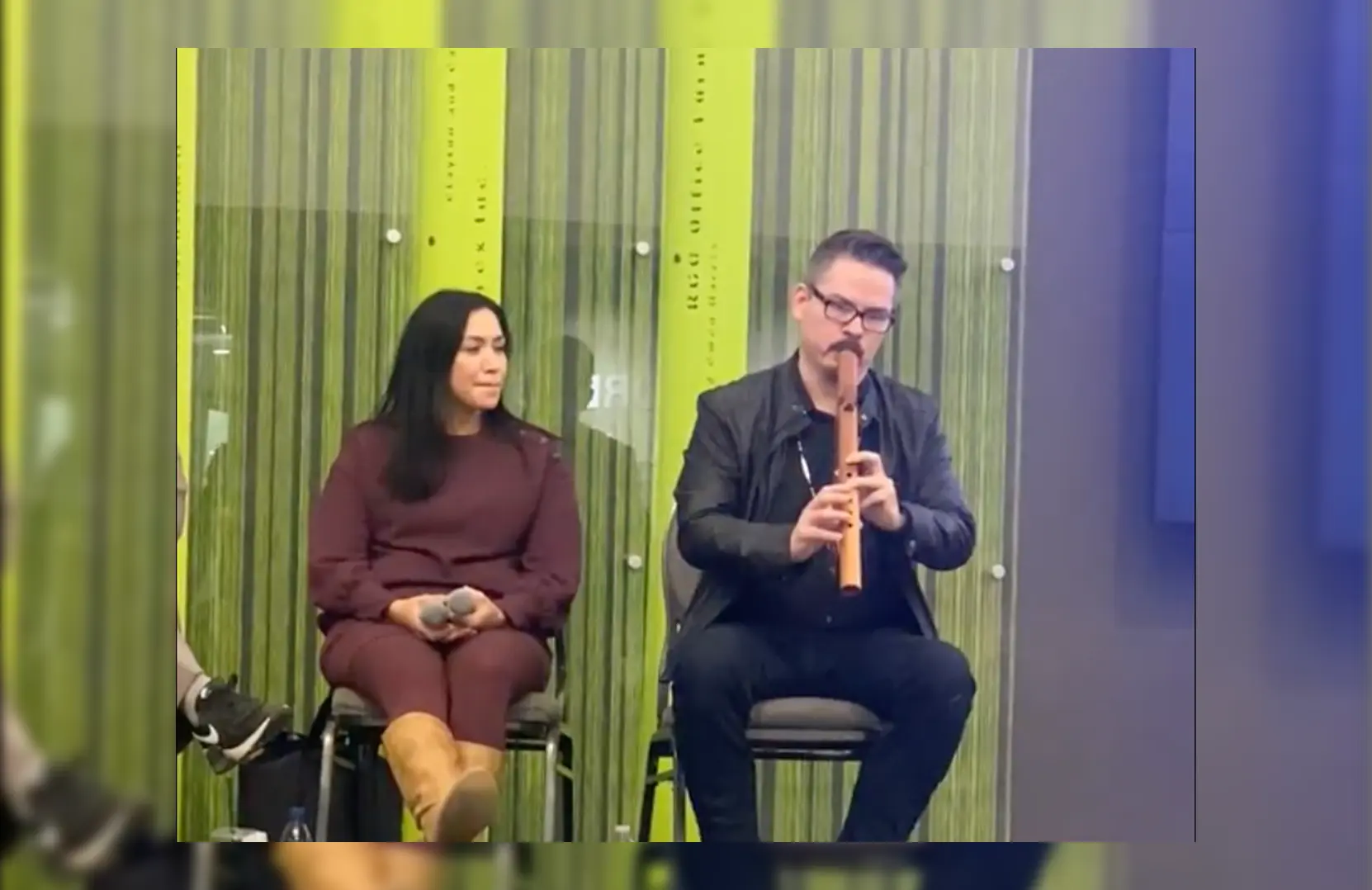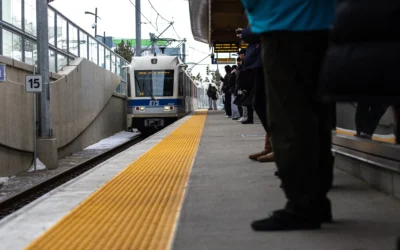On Jan. 30, ahkamêyimok: Stories of Hope, an Indigenous-led forum on recovery and hope through community, had Allard Hall’s central atrium packed with eager ears. Aaron Paquette, Edmonton’s Dene Ward councillor delivered the forum with his partner, Clarice Anderson, who has worked in Edmonton’s education sector for 19 years. Amber Dion and Terri Cardinal, the podcast hosts for 2 Crees in a Pod, moderated the event. Cardinal and Dion are also highly involved at MacEwan; Dion is an assistant professor in the health and community studies faculty, and Cardinal is a sessional instructor and the director of Indigenous intiatives at kihêw waciston, MacEwan’s Indigenous centre.
The two-hour forum is the first of three forums scheduled for the 2024 winter term’s Interdisciplinary Dialogue (IDP). It is also the first in-person forum since the pandemic. The Interdisciplinary Dialogue Project’s first series was in 2017. This term’s theme is “Cities of Tomorrow.” The forum began with Lindsay Whitson, the IDP co-chair, welcoming the attendees and praising the turnout.
Next, George Desjarlais, an Indigenous knowledge keeper and facilitator at kihêw waciston, said a prayer.. Desjarlais is from the Frog Lake Cree First Nation in Northeastern Alberta. The older generations in his community encouraged him to persevere with the deeply significant Cree word “ahkamêyimok.”
MacEwan’s president and vice-chancellor Dr. Annette Trimbee delivered two land acknowledgments, one by script and a personalized one. Trimbee, a Red River Métis from Winnipeg, asked the community to consider the ground underneath MacEwan and said, “Whose footsteps have crossed this land?”
Paquette briefly recounted the morning of Jan. 23 when he heard gunshots and evacuated city hall. To him, the shooting happened because someone did not feel connected to the community. He and his wife have firsthand experience with the power of community.
Then, the panel began to tell their stories of hope.
Dion asked whether hope is created or acknowledged. Anderson responded by sharing how she had survived being hit by two separate vehicles during a jog in 2012. Anderson had a young son at home. She knew she was dying and she began praying. When she had woken up in the hospital with 28 broken bones, including shattered vertebrae, Anderson said that she felt an amazing sense of happiness and gratitude. Paquette’s Facebook post about the accident went viral, and people worldwide became a community of humans praying for Anderson. She knew she would heal.
Anderson is Cardinal’s older sister. When the accident happened, Cardinal said that she remembered the hopelessness of the situation. She went to a sweat lodge and prayed. “It was the only thing I knew that could help her,” said Cardinal.
Another one of the shared stories was what happened to Paquette when he was 19. He was suicidal and standing on the railing of a high-level bridge right before an August dawn. When the sun rose, its hand touched Paquette’s head gently. He heard his relatives say, “We’re here to laugh.” Paquette told the audience, “I didn’t jump off that bridge, but I flew… You are worth so much; you are worth everything.” As he said this, he looked at his two young children watching from the second floor. Anderson said that her husband’s story reminds her of their ancestors’ strength.
Dion said that no one person is exempt from human suffering. The panel described how coming together in times of suffering, bringing everything people can, including woven moments of humor, is an Indigenous expression of love.
At one point, Paquette asked the forum attendees to raise their hands if they’d ever been hurt or felt othered by a person. He then asked the same question but with higher frequencies like, 10, 50, and 100. While arms fell, Katrina Koe, a student pursuing a bachelor’s in anthropology with a sociology minor, kept her hand up until Paquette reached 100. After acknowledging her need for a hug, Paquette asked the attendees if they would help and support Katrina. The audience members’ hands shot up.
Koe is originally from Treaty 11 territory, in the isolated town of Inuvik, N.W.T. In an interview after the event, she said that the support was something she needed to hear. In 2009, Koe came to Treaty 6 territory for university. She can speak to the displacement felt by Indigenous people when they move away for school, “because our community is so important to us.” Koe says that while she feels disconnected from her culture, she’s also struggled with imposter syndrome for a long time. That is, until she kept telling herself that, “showing up is resistance.” Now, Koe considers kihêw waciston her new community. She feels like Treaty 6 is her home because of her vulnerability and trust in her process.
To end the forum, Paquette played his cedar flute. Organizers then directed the approximately 214 attendees down the hall to the Jerry Wood Atrium. People of all demographics reflected on the night’s stories by making single “zine” pages from various crafting supplies. Organizers then scanned each zine page to produce a full zine. While making her zine page, student Amber Shergill said, “It’s really fun because I’m… here with my friends and we’re all like talking about community, talking about suffering, talking about healing…”
Photography by Rebecca Reeves.
CORRECTION Feb. 21: Jan 30 actually marked the return to in-person forums since the pandemic shifted online in 2021. The story has been amended to clarify this.





0 Comments